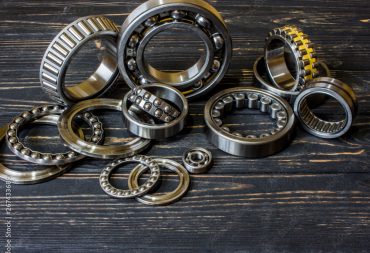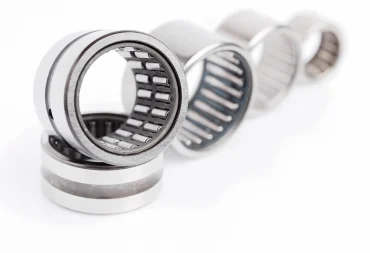Cylindrical Bearings: High-Performance Solutions for Heavy-Duty Applications
Cylindrical bearings are an essential component in various mechanical systems, designed specifically to support radial loads with high efficiency while maintaining optimal performance at elevated speeds. Unlike ball bearings, cylindrical bearings use cylindrical rollers as the rolling elements, which provide a larger contact surface between the roller and raceway. This unique design significantly reduces wear, enhances load-bearing capacity, and improves durability, making them ideal for heavy-duty applications in industries where reliability and longevity are crucial.
Key Features of Cylindrical Bearings
Cylindrical bearings possess several features that make them well-suited for demanding environments:
Increased Load Capacity: The cylindrical roller design distributes load across a larger surface area, allowing these bearings to support heavier radial loads than most other types of bearings. This quality makes them ideal for applications that involve significant stress, such as machine tools and industrial equipment.
High-Speed Operation: Cylindrical bearings are engineered to perform well at high rotational speeds without excessive heat generation. Their design minimizes frictional resistance, allowing machinery to run smoothly at faster speeds, which is particularly valuable in applications such as automotive transmissions and electric motors.
Durability and Longevity: The robust construction and large contact area of cylindrical bearings reduce the impact of wear, extending their operational lifespan. This durability is essential for industrial applications where machinery runs continuously and must withstand harsh conditions.
Low Maintenance Requirements: Many cylindrical bearings are designed with advanced lubrication systems or come pre-lubricated, reducing the need for frequent maintenance. This feature helps lower operating costs and minimizes downtime, which is crucial for maintaining productivity in high-demand environments.
Excellent Heat Dissipation: The large surface area and reduced friction in cylindrical bearings facilitate effective heat dissipation, preventing overheating and ensuring stable performance even under heavy loads and high speeds.
Misalignment Tolerance: Although cylindrical bearings are primarily designed to handle radial loads, some configurations can accommodate slight misalignment. This versatility adds to their adaptability in various mechanical setups.
Types of Cylindrical Bearings
There are several types of cylindrical bearings, each tailored for specific load requirements and performance needs:
Single-Row Cylindrical Bearings: Single-row cylindrical bearings are commonly used in high-speed applications where radial load support is required without significant axial loads. Their simple, efficient design makes them ideal for electric motors and gearboxes.
Double-Row Cylindrical Bearings: Double-row bearings provide enhanced load capacity by utilizing two rows of cylindrical rollers. They are suitable for applications with higher radial loads and are often found in machine tools and heavy machinery.
Full Complement Cylindrical Bearings: Full complement bearings are designed without a cage, allowing them to fit a larger number of rollers. This feature enhances their load-bearing capacity, making them well-suited for heavy-duty applications that prioritize load support over speed, such as mining equipment and industrial presses.
Multi-Row Cylindrical Bearings: Multi-row cylindrical bearings are designed to accommodate extreme radial loads in high-performance industrial applications. With multiple rows of rollers, they provide exceptional load support, making them ideal for steel mills, power plants, and other heavy industrial environments.
Applications Across Various Industries
Cylindrical bearings are versatile components with broad applications across multiple industries. Their design allows them to excel in high-load and high-speed environments, providing consistent performance in the following areas:
Automotive Sector: In the automotive industry, cylindrical bearings are commonly used in transmissions, differentials, and wheel hubs. Their ability to handle high radial loads and maintain stability at high speeds ensures smooth, reliable operation, contributing to vehicle efficiency and durability.
Machine Tools: Machine tools such as lathes, milling machines, and grinders rely on cylindrical bearings for stable, precise motion. The bearings’ low friction and high-speed capability enhance the accuracy of machining processes, ensuring high-quality results in metalworking and manufacturing.
Industrial Equipment: Heavy machinery, including cranes, conveyors, and mining equipment, utilize cylindrical bearings to handle substantial radial loads. Their durability and resistance to wear make them suitable for continuous operation in challenging environments, where reliability is paramount.
Electric Motors and Generators: In motors and generators, cylindrical bearings support the rotating shaft, enabling smooth, high-speed operation with minimal energy loss. This efficient motion improves power transmission, reduces vibration, and enhances overall system longevity.
Steel Mills and Power Plants: Cylindrical bearings are extensively used in high-stress environments like steel mills and power plants, where machinery must withstand continuous operation under extreme conditions. Multi-row or full complement designs are often chosen for these applications due to their enhanced load-bearing capacity.
Benefits of Using Cylindrical Bearings
Cylindrical bearings offer a range of advantages, making them a preferred choice for heavy-duty applications:
Enhanced Efficiency and Power Transmission: The reduced friction in cylindrical bearings allows for smoother motion and improved power transmission, leading to higher system efficiency and performance. This efficiency is particularly beneficial in automotive and industrial applications, where energy savings translate to cost savings.
Reduced Wear and Extended Equipment Life: With a larger contact area and strong resistance to wear, cylindrical bearings contribute to the extended lifespan of machinery. This quality minimizes the need for frequent replacements, thereby reducing operational costs over time.
Versatile Performance: Cylindrical bearings can handle a range of conditions, from high-speed to high-load applications. Their adaptability and low maintenance requirements make them a versatile solution across industries.
Minimal Noise and Vibration: Thanks to their efficient design, cylindrical bearings operate with minimal noise and vibration, creating a quieter, smoother experience in applications like electric motors and automotive systems. This quality not only enhances user comfort but also reduces the risk of wear due to excessive vibration.
Reliable Performance in Harsh Environments: Cylindrical bearings are built to withstand challenging conditions, including exposure to dust, moisture, and high temperatures. This reliability is essential for machinery operating in rugged industrial settings, where consistent performance is critical for maintaining productivity.
Selecting the Right Cylindrical Bearing
Choosing the correct cylindrical bearing for a specific application depends on several factors, including load capacity, speed requirements, and environmental conditions. For applications requiring extreme load support, full complement bearings are often preferred, while single-row or double-row bearings are ideal for high-speed operations. Additionally, selecting the right lubrication type and considering factors like contamination resistance are crucial for optimizing performance.
Conclusion
Cylindrical bearings play a fundamental role in ensuring the reliable, efficient operation of mechanical systems across various industries. Their ability to handle heavy radial loads and maintain stability at high speeds makes them invaluable in applications ranging from automotive transmissions to industrial machinery and power generation. With their robust construction, cylindrical bearings reduce wear, enhance power transmission, and support long-lasting performance, making them a critical component in high-demand environments. Whether in automotive applications or heavy-duty industrial setups, cylindrical bearings provide the durability, reliability, and efficiency necessary for modern mechanical systems to excel.





Comments (4)
Diwa Alejandro Galvez
9 September 22 4:53 amVery responsive and detailed in what I needed fixed and what other issues existed. They were able to work with my warranty to get many outstanding items.
Ed Hickman
12 September 22 2:03 amWould highly recommend this auto shop! He was very professional, very helpful & had great prices. Will definitely come back
Richard Joash
12 September 22 2:04 amMy car needed a new fuel pump. Took my car in and had the repairs done in the same day. Didn’t have issues and the car has been working fine.
Richard Joash
12 September 22 2:06 amIve been using this mechanic shop for over 8 years. Hes very knowledgeable, trustworthy, fair, and clear. He has experience in many makes. Highly recommend without reservation.